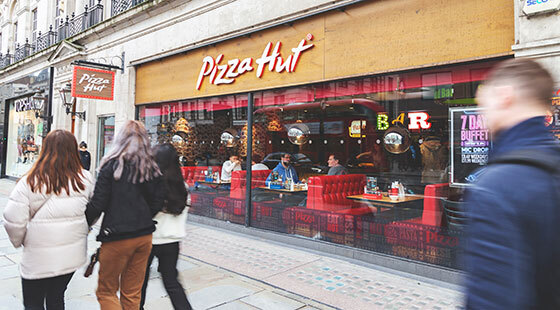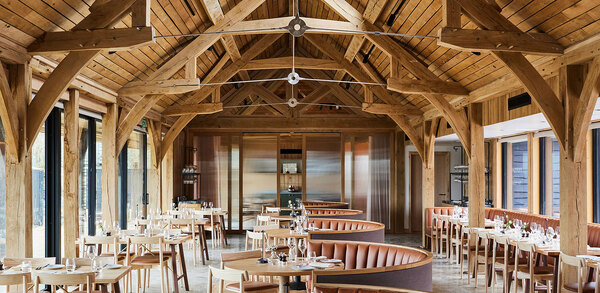Better Business: Tuddenham Mill, Suffolk
A redesign at Tuddenham Mill has reinvented the venue as a chic hotel offering top-class cooking. Rosalind Mullen reports
Need to know Tuddenham Mill, in its present form of a bijou boutique hotel with first-class restaurant, opened its doors in 2007. Part of the four-strong East Anglian-based Agellus Hotels, which had launched just two years earlier, the fabric of Tuddenham's core building, is an old Grade II-listed water mill, first mentioned in the Domesday book (although the current building dates back to the 18th century).
Its location on the Suffolk-Cambridgeshire border between Newmarket and Bury St Edmunds, with a picturesque mill pond outside, was what first attracted Agellus co-owner and founder Sarah Harrod to the mill. "We look to purchase remarkable properties that have potential," she explains. "Tuddenham had lots of character in a lovely setting and the owner was wanting to sell so that he could concentrate on his other business interests. So it fitted our brief perfectly."
From the outset, Harrod wanted to turn the property into a food as well as a hotel destination, so the appointment of a talented head chef was crucial. Paul Foster, a protégé of Sat Bains's eponymous two-Michelin-starred Nottingham restaurant, fitted the bill. A chef with all the modern techniques in his arsenal, his style nevertheless revolves around the seasons and has a naturalness and modern sensibility that reflected Tuddenham's aim to provide "style without stuffiness".
It wasn't long before Foster repaid the faith put in him with recognition from influential guides and publications in the restaurant world, including the AA (three rosettes) and Caterer and Hotelkeeper itself, from which he gained an Acorn Award in 2011.
Refurbishment and relaunch
That planning permission took longer to get rubber-stamped than anticipated because of Tuddenhamâs Grade II status. But designs for low, wood-clad buildings with interior bleached ceiling beams sympathetic to the pastoral surroundings and architectural style of the original mill eventually won the day. Nevertheless, hitches along the way, such as the discovery of asbestos on site, meant that the whole refurbishment project eventually overran by six months, pushing the total timespan of the refurbishment to 18 months: and tipping the spend to just over £1m.
Bedrooms and bathrooms Nailing the right standard and ambience in the bedrooms and bathrooms was a central part of Agellusâs strategy. The look is neutral, minimalistic and contemporary, with some of the bedrooms having baths located in the main space for added impact. Walk-in showers, huge stone free-standing baths and luxury toiletries are the order of the day. âIf you spend money on anything, spend it on bathrooms,â advises Harrod, who called in the expertise of London-based bathroom designer, CP Hart.
The bedrooms continue the understated luxury feel, with all the contemporary must-haves: Bose sound systems, flat-screen TVs, stylish Italian furniture and 400-thread Egyptian cotton sheets. As a consequence, Tuddenham has attracted a steady stream of romantic weekend breakers and the seal of approval from some influential guides, such as Mr & Mrs Smith, not to mention four AA stars for its accommodation.
Marketing and customer profile Mr & Mrs Smith, says Harrod, is âthe single most importantâ generator of hotel business for Tuddenham. She estimates that around 30% of leisure business comes via the specialist boutique hotel booking service. Tuddenhamâs general manager, Lyndon Barrett-Scott, quantifies the companyâs influence further. âWe get an overall 45% of repeat business, 20% of which is generated by Mr & Mrs Smith,â he says.
As for the actual profile of guests and diners, Tuddenham Mill attracts a broad spectrum of age groups, with a lot of trade being drawn from Londoners wanting a slice of rural escapism. âIâd say 70% of weekend trade is Londoners,â estimates Barrett-Scott. However, Tuddenham has worked hard at bringing in local visitors as well, both to the restaurant and to stay in the hotel, via its package deals. One in particular, Cosy Sunday, offering a night at Tuddenham plus breakfast from £65 per person (depending on the bedroom) has ensured the hotel is usually full with locals or guests with short Monday morning commutes. The package is tied in with the guestsâ eating in the restaurant â" spending a minimum of £50 â" so that base is covered as well.
There are other mid-week packages that Tuddenham puts out, all designed to tempt in trade between Monday and Thursday. Most tie in with dining in the restaurant, but others are linked to the race sales or meetings at nearby Newmarket â" and a couple centre around upmarket shopping and spa trips to Bury St Edmunds.
For events, Tuddenhamâs small size limits the type of these at the moment. Weddings, which have gone up 50% on 2011, estimates Barrett-Scott, have to have site exclusivity in order to quell disruption to other guests. Car launches, corporate drinks, private dining and wedding shows are also part of the mix.
Future plans Both Harrod and Barrett-Scott pinpoint an expansion of bedroom numbers as being the most likely next step for Tuddenham. âMaybe, also, a conference and banqueting suite with spa treatment rooms,â says Barrett-Scott. Foster, on the other hand, is hoping to develop a kitchen garden. With around 12 acres of grounds â" eight of them being water meadows â" Tuddenham has plenty of potential.
Spotlight on food The hotelâs growing reputation rests not only on its rooms, but also on its food offering. Foster â" whose career took him via ground-breaking restaurants such as the USAâs WD50 and the French Laundry, and Nottinghamâs Restaurant Sat Bains with Rooms â" cooks in what can loosely be termed as modern European style, powered by the seasons and local produce: but it has a British accent, often using foraged food (sea buckthorn, chickweed, mudwort) to accent his dishes.
His intelligent use of techniques, like low-temperature cooking, and contemporary ingredients never overpowers the purity of flavour of his main produce. âI use my technique to keep the flavours as fresh and pure as possible,â he says.
In 2011, The Observerâs influential critic, Jay Rayner, commented: âHis ideas are controlled. His flavour combinations make sense. If you want a plate of food that shouts 2011 go to Tuddenham Mill.â Raynerâs influence undoubtedly led to Foster getting the Observer Food Monthlyâs Young Chef of the Year award in that same year. Heâd already received an Acorn â" and recently Tuddenham got a Good Food Guide rating of 6/10 and made it into its top 50 UK restaurants in the 2013 guide.
Foster puts out a range of menus, including a nine-course tasting menu. âThatâs taken off massively â" it averages out at about 20% of diners opting for the tasting menu,â he says.
Â



















